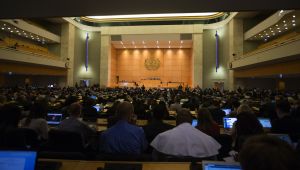The year is 2020. The U.S. secretary of state arrives in Baghdad to meet with the Iraqi prime minister. The discussion centers on three issues: Iran, Israel-Palestine and oil.
The good news is that Iran has recently been swept up by a student-led constitutional revolution. The bad news is that this newly liberal regime continues to expand the nuclear arsenal that was officially declared when the Islamic Republic tested a nuclear weapon 10 years earlier. Meanwhile, Palestinian militants have launched a third intifada in honor of the late Chairman Yasser Arafat, who died of natural causes in 2018. And oil prices have reached record highs, driven mostly by skyrocketing consumption in China and India and decreasing slack in the Saudis' oil supply.
Only after addressing these top agenda items does the secretary of state put a more sensitive question to the Iraqi leader: "Don't you think it's time you lifted martial law in Iraq?"
---
After last month's surprise transfer of power from the Coalition Provisional Authority to the new Iraqi government, Prime Minister Iyad Allawi did not back away from recent suggestions that martial law may be the only way to quell the increasingly aggressive and well-coordinated Iraqi insurgency.
Nor have the Iraqi people recoiled at the idea of tougher tactics. Defense Minister Hazim al-Shalan was more than self-justifying when he told reporters, "It's the people who want stronger measures in Iraq."
The question is, will the cost of keeping Iraq in one piece be a permanent state of emergency?
To be fair, martial law clearly has its virtues. Imagine that you cannot leave your home without fear of the next car bombing, or mortar attack, or petty mugging. Thieves regularly loot the convenience store on the corner without a cop in sight. All female members of your family are forced to stay indoors to avoid abduction, rape or worse. If the situation were such in Boston, where I live, a daily curfew, widespread checkpoints and a ban on public demonstrations would seem like welcome respite.
But the vices of martial law are equally significant. First, once the emergency itself has passed, "state of emergency" can become a rationale for all manner of state oppression. Second, martial law can lead to a vicious circle in which it perpetuates the very emergency it is designed to put down. If enacted, a state of emergency in Iraq will not have created the insurgency, but it will make it easier for the insurgents to justify their crusade and recruit new foot soldiers.
Look at Syria and Egypt. The Syrian government has imposed emergency laws on its population since the Baath Party took over in a 1963 coup.
Syrian President Bashar Assad continues to justify this condition on the bogus, if technically correct, grounds that Syria remains at war with Israel, as well as a domestic Islamic terrorist threat. Egyptian President Hosni Mubarak declared a state of emergency when he took power 23 years ago and shows no sign of lifting it. When U.S. officials push the Egyptian leader on human rights issues, he sternly— and perhaps rightly— reminds them that the alternative to his strongmanship is an Islamic theocracy in Cairo.
End of discussion.
Of course, neither government approaches the viciousness of Saddam Hussein's regime. But neither is good for the Bush administration's "forward strategy of freedom" in the Middle East, which assumes that the severe restrictions on civil liberties throughout the region have created a poisonous political atmosphere that breeds terrorism.
With the utopian aims of the Iraq gamble now put on the shelf, it is likely we will have to live with what Newsweek columnist Fareed Zakaria would call an "illiberal democracy" in Baghdad. In fact, at this point an illiberal democracy led by an elected autocrat would qualify as an unquestionable success when compared with the alternative— a horrific civil war that, after claiming thousands of lives, would lead to endless border disputes. In such a scenario, solving the Israeli-Palestinian crisis would look like child's play.
But if, in 2020, Iraq has been taken over by a president-for-life who, while moderate next to Hussein, is little more than a benign autocrat with a conciliatory stance toward the United States and Israel, the Bush administration's "generational struggle" against terrorism will have been for naught.
Following the transfer of sovereignty, British Prime Minister Tony Blair sought to put the best possible face on the prospect of martial law.
"It's not going to be about taking away people's freedoms," he said, "It's going to be about allowing those freedoms to happen." But no matter how necessary, martial law could just as easily become the first nail in the coffin of Iraqi liberal democracy.
Grant R. Mainland is a research specialist at the BelferCenter for Science and International Affairs at Harvard University's Kennedy School of Government.
Mainland, Grant. “Emergency Exit: The Imposition of Martial Law.” Chicago Tribune, July 11, 2004


